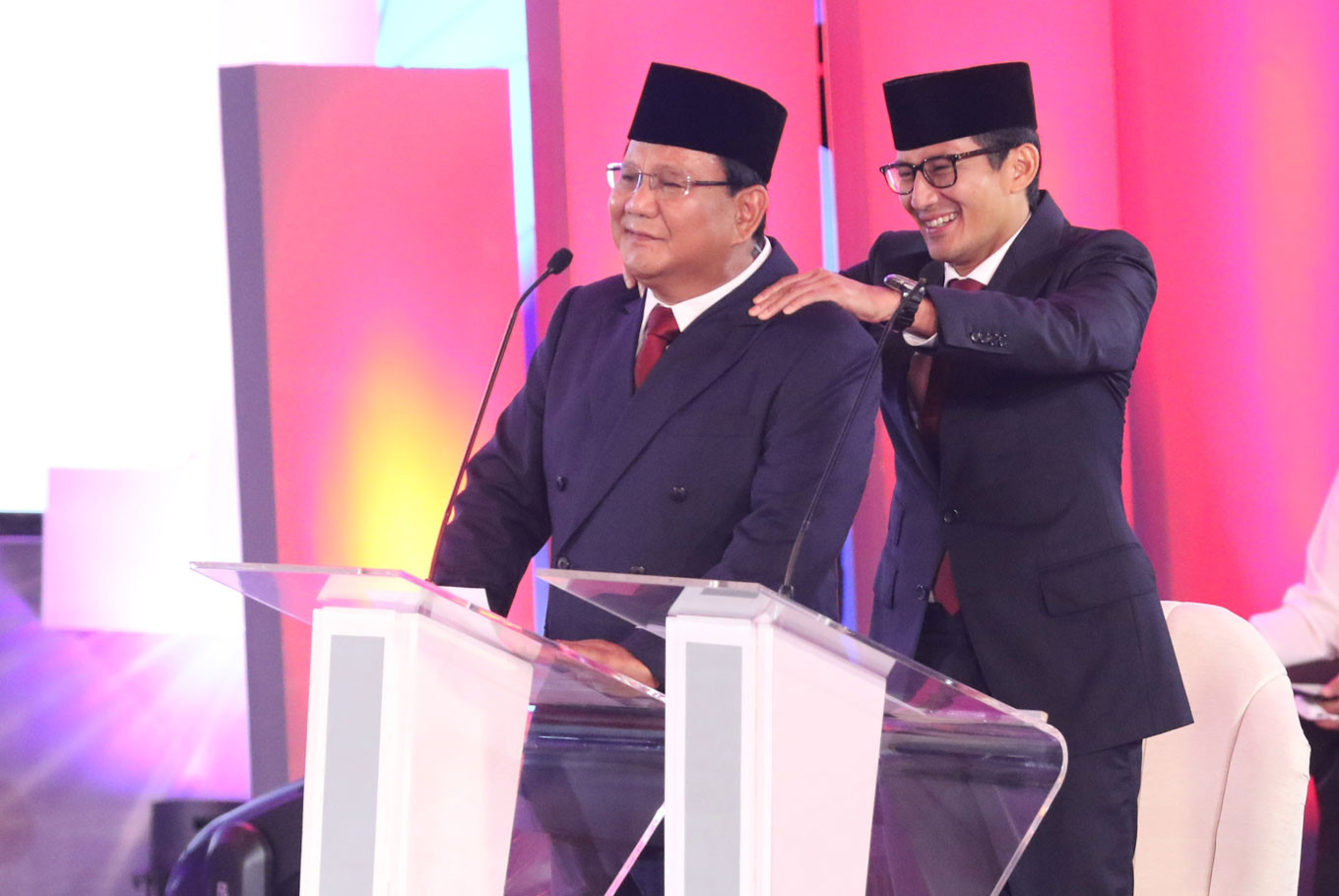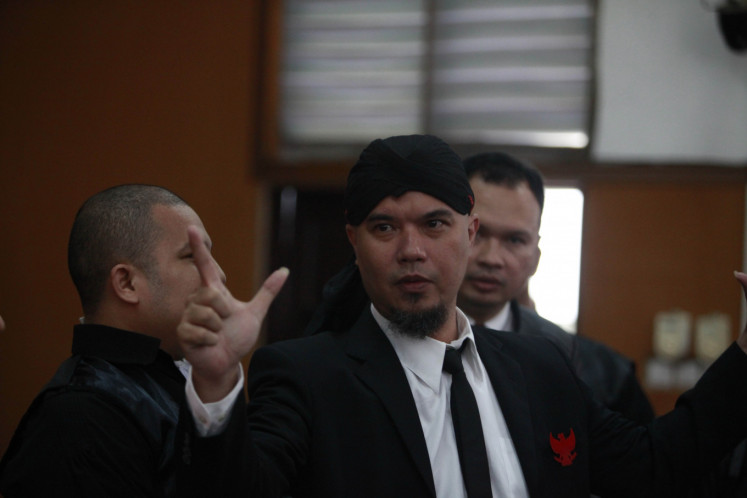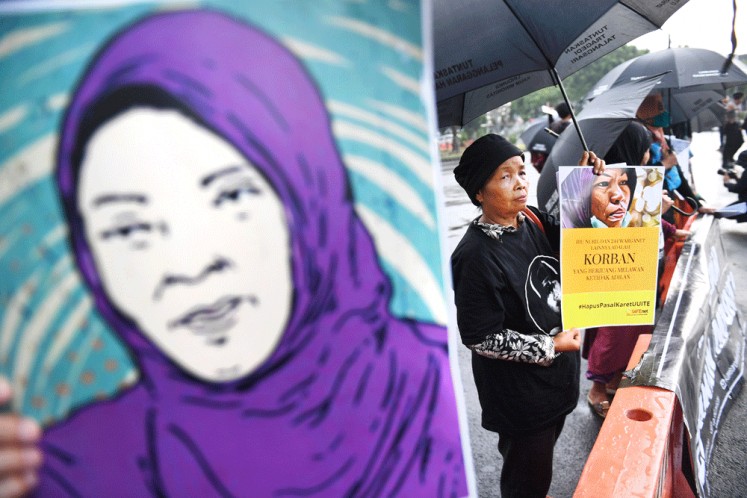Popular Reads
Top Results
Can't find what you're looking for?
View all search resultsPopular Reads
Top Results
Can't find what you're looking for?
View all search resultsSandiaga’s pledge to revise ITE law meets with skepticism
On Thursday, after visiting musician and opposition activist Ahmad Dhani in prison after his conviction under the ITE Law, Sandiaga posted a video on his Instagram account with a caption promising to revise the law and remove the “elastic”, or ambiguous, clauses it contains.
Change text size
Gift Premium Articles
to Anyone
V
ice-presidential candidate Sandiaga Uno has promised that if elected, his government will revise the controversial 2008 Electronic Information and Transactions (ITE) Law, but political opponents and civil society activists have cast doubt on the sincerity of the pledge.
On Thursday, after visiting musician and opposition activist Ahmad Dhani in prison after his conviction under the ITE Law, Sandiaga posted a video on his Instagram account with a caption promising to revise the law and remove the “elastic”, or ambiguous, clauses it contains.
“The law should not be used to hit opponents and help friends,” he wrote. “We should look at the silver lining of [Dhani’s] case, going forward Prabowo-Sandi will revise the ITE Law, which contains many elastic clauses. Those elastic clauses create gray areas that are very much open to interpretation.
Dhani was found guilty of “spreading information that is intended to create hatred or hostility to individuals and/or groups based on ethnicity, religion, and race,” in violation of Article 28 of the law, based on three tweets he made in 2017 calling former Jakarta governor Basuki “Ahok” Tjahaja Purnama a blasphemer and insulting his supporters.
Dhani, who is also running for a House of Representatives seat with the Gerindra Party, is not the first Prabowo Subianto supporter to run afoul of the ITE Law.
Musician Ahmad Dhani makes a hand gesture after he listens to the verdict that sentenced him to 18 months' imprisonment at South Jakarta District Court on Jan. 28. (JP/Iqbal Yuwansyah )Fellow opposition activist Ratna Sarumpaet is currently in police custody awaiting trial for violation of the same article, after falsely claiming that she had been assaulted by three unknown assailants last September. She later admitted that the bruises on her face were the result of cosmetic surgery.
Previously, Buni Yani, formerly a member of Prabowo’s campaign team, had been convicted for violating Article 32 of the law, after selectively editing a video in which Ahok warned Thousand Islands regency residents about people misusing Quranic verses for political purposes.
Gerindra politician and Prabowo campaign spokesperson Andre Rosiade said the ticket wanted to revise the ITE law because it had become “crueler than the Criminal Code.”
“Too many people have fallen victim to the law,” he told The Jakarta Post on Sunday. “It needs to be revised so that it is more clearly targeted.”
When asked if Prabowo and Sandiaga would also consider revising Article 156 of the Criminal Code on blasphemy, which many activists have also slated for being elastic, Andre demurred.
“The Blasphemy Law is clearer and is still necessary,” he said. “There is a clear process that involves expert witnesses, ulema recommendations, and so forth. The ITE Law, on the other hand, needs revision.”
He also denied that Dhani’s conviction was the reason for Sandiaga’s promise, but said that revising the law was important to stop the government from “silencing political opponents.”
President Joko “Jokowi” Widodo campaign spokesperson and NasDem Party lawmaker Irma Suryani Chaniago, however, cast doubt on the Prabowo-Sandiaga team’s motivations.
“We welcome any revisions as long as they are constructive,” she told the Post. “But not if they are only meant to get person A or person B out of prison.”
She said the Jokowi government was open to criticism, but that the Prabowo team was often hypocritical.
“If one of their cronies does something then it cannot possibly be wrong,” she said. “But if their opponents do something then it has to be wrong.”
She added that the Jokowi team would be open to revising the ITE Law, or any law, as long as the revision led to a better law.
Participants of Kamisan, a silent protest held every Thursday in front the Presidential Palace to call on the government to resolve past human rights abuse cases, voice their support for Baiq Nuril Maqmun, a 37-year-old teacher in West Nusa Tenggara (NTB) who was convicted of defaming a man she accused of sexually harassing her. (ANTARA/Akbar Nugroho Gumay)Ellen Kusuma of the Southeast Asia Freedom of Expression Network (SAFEnet), which has long called for a revision of the ITE Law, said she did not want the fight to revise the law to be tainted by “political posturing.”
“Whoever wins the election has the responsibility to revise the law because it is a blight on Indonesia’s human rights situation,” she told the Post.
She said that articles 27, 28, and 29 of the law, on defamation, hate speech and extortion, respectively, were the articles that most urgently needed alteration.
Article 27 in particular accounted for 188 out of the 260 ITE Law cases in SAFEnet’s records, including the high-profile case of Baiq Nuril Maqmun, a West Nusa Tenggara woman who was convicted of defaming her alleged sexual harasser.
“The problem is that the elastic clauses in the law tend to be advantageous to whoever is in power,” she said. “So whoever wins, we will need to ensure the revision takes place.”












